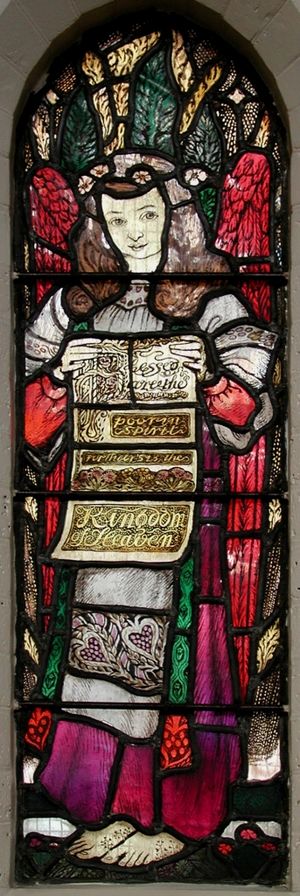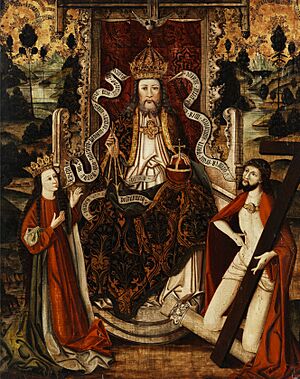Kingdom of God facts for kids

The idea of the kingship of God is found in all major religions that believe in one God, like Judaism, Christianity, and Islam. Sometimes, it's also called the Kingdom of God or Kingdom of Heaven. This idea means that God is the supreme ruler over everything.
The idea of God's kingship started way back in the Hebrew Bible (which Christians call the Old Testament). It talks about "his kingdom," but it doesn't use the exact phrase "Kingdom of God."
In the New Testament, the "Kingdom of God" (or "Kingdom of Heaven" in the Gospel of Matthew) is a super important part of what Jesus taught. The Gospel of Mark even says that the good news (the gospel) is all about the Kingdom of God. This term shows that Jesus Christ rules over all creation. Matthew's Gospel uses "Kingdom of Heaven" often because Jewish people at the time were very careful about saying God's name directly.
The Quran, the holy book of Islam, doesn't use the term "kingdom of God." However, it talks about God's mighty "throne" that covers the heavens and the Earth. It also mentions Abraham seeing the "Kingdom of the heavens." The Baháʼí Faith also uses the term "kingdom of God" in its writings.
Contents
God's Rule in Ancient Texts
In the Hebrew Bible
The phrase "kingdom of the LORD" appears a couple of times in the Hebrew Bible. For example, in 1 Chronicles 28:5 and 2 Chronicles 13:8. Other times, it just says "his kingdom" or "your kingdom" when talking about God. For instance, 1 Chronicles 29:10–12 says, "Yours is the kingdom, O Lord." And Daniel 3:33 (or Daniel 4:3 in Christian Bibles) says, "His kingdom is an everlasting kingdom."
The Hebrew word malkuth means God's "rule" or "authority" as the heavenly King. It's not just about a place, but about God's power and control. Some Psalms (like 93 and 97) celebrate this idea with the shout, "The Lord is King!"
Some parts of the Bible, like 1 Kings 22:19 and Isaiah 6, describe the Throne of God. However, some thinkers, like Saadia Gaon and Maimonides, believed these descriptions were symbolic, not literal.
Between Old and New Testaments
The phrase "the Kingdom of God" wasn't very common in writings from the time between the Old and New Testaments. When it did appear, like in the Psalms of Solomon, it usually meant God's rule, not a specific place or a new era.
Sometimes, though, it did refer to a future event, like in the Assumption of Moses. In these cases, God's Kingdom meant when God's rule would be clearly shown to everyone, bringing about a new world order. Some people also had a "national" view, believing that a special leader (the messiah) would free them and create a new state of Israel.
Jesus' Teachings on the Kingdom

In the Gospel of Luke, Jesus describes the Kingdom of God by saying, "The kingdom of God does not come with observation; neither shall they say, Lo here! or, lo there! for, behold, the kingdom of God is within you." This suggests it's not something you can just point to.
In the Synoptic Gospels (Matthew, Mark, and Luke), Jesus often talks about God's kingdom. But he never gives a clear definition. It seems people at the time already understood what he meant. Karen Wenell wrote that Mark's Gospel shows the Kingdom of God starting to be built.
The Gospel of Thomas, an ancient text not in the Bible, quotes Jesus saying the Kingdom is "inside of you and outside of you." It also says, "The kingdom of the Father is spread out upon the earth, and people do not see it.” This means it might already be here, but we don't always notice it.
The Apostle Paul, in his letter to the church in Rome, explained the Kingdom of God as "not a matter of eating and drinking, but of righteousness, peace and joy in the Holy Spirit." This means it's about how we live and feel, not just rules about food.
The "Kingdom of God" (or "Kingdom of Heaven" in Matthew) is a main part of Jesus' teachings. It connects to the Old Testament idea that God's rule is central to his relationship with people.
Most of the time, the Greek word basileia (kingdom) in the New Testament refers to the Kingdom of God or Heaven. Matthew likely used "heaven" because his Jewish readers were careful about using God's name too often. However, some scholars like Dr. Chuck Missler believe Matthew used both terms on purpose, showing they might mean slightly different things. "Kingdom of God" is translated to Latin as Regnum Dei, and "Kingdom of Heaven" as Regnum caelorum.
The Kingdom in Different Religions
Christianity
The Old Testament calls God "the Judge of all," and Christians believe everyone will eventually be "judged." The Nicene Creed, a statement of Christian beliefs, says that Jesus will be the one to judge.
There isn't one single agreement among scholars about what "Kingdom of God" means. Some see it as a way of living, others as spreading the Christian message, and some connect it to a future world. It can be interpreted in many ways to fit different Christian ideas.
In the New Testament, the Throne of God is mentioned in different ways. Sometimes Heaven itself is God's throne. Other times, God's throne is "in heaven," with Jesus sitting at the Right Hand of God.
Islam
The term "kingdom of God" isn't in the Quran. The Arabic word for kingdom is mamlaka. But the Quran uses mul'kan to talk about Heaven. For example, in 4:54, it says God gave Abraham's people "a great kingdom." And in 6:75, it says God showed Abraham "the kingdom of the heavens and the earth." The word Maalik (Owner) is used in 1:4, saying God is "The owner of the Day of Judgement."
Baháʼí Faith
The term "kingdom of God" is used in the writings of the Baháʼí Faith, including those by its founder, Bahá'u'lláh, and his son, `Abdu'l-Bahá. In Baháʼí teachings, the kingdom of God is both a personal spiritual state and a future state of the world.
Bahá'u'lláh taught that religious scriptures predict a future leader who will bring a golden age of humanity, which is the kingdom of God on Earth. He claimed to be this leader and said his teachings would bring about this kingdom. He also explained that prophecies about the "end times" and the arrival of the kingdom of God are symbolic, meaning they refer to spiritual changes and renewal. Baháʼí teachings also say that by worshipping God and serving others, people grow spiritually and can enter the kingdom of God even while they are alive.
See also
 In Spanish: Reino de Dios para niños
In Spanish: Reino de Dios para niños
 | Laphonza Butler |
 | Daisy Bates |
 | Elizabeth Piper Ensley |

